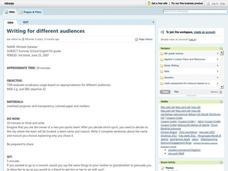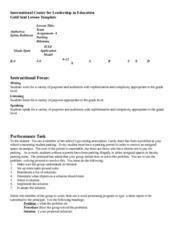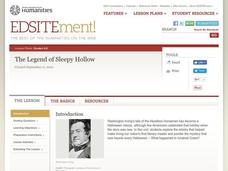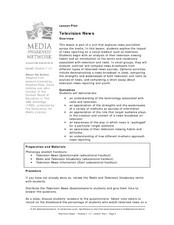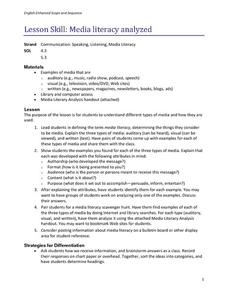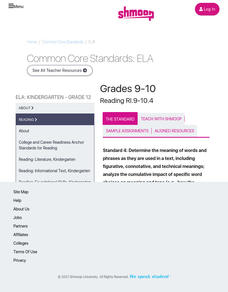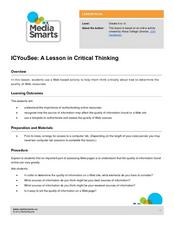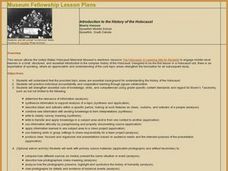Curated OER
Lesson Skill: Determining Audience and Purpose
“. . . the car looked as it had caught some terrible disease.” Pairs read and then illustrate a passage from either “The Year I Drove through the Car Wash” or “Riding Is an Exercise of the Mind” in preparation for a discussion of...
Media Smarts
The Newspaper Front Page
Hot off the presses! A perfect instructional activity idea for a journalism class or even a language arts class looking to incorporate some informational texts. Young writers analyze the front pages of various newspapers to determine the...
Curated OER
Writing For Different Audiences
Evaluate the use of vocabulary in written paragraphs to make the determination of its appropriateness for a particular audience. As a class, seventh graders develop a fictional team and write three paragraphs to different audiences based...
Media Smarts
Media Awareness Network: Hate or Debate?
Discuss the difference between legitimate debate on a political issue and arguments that are based on hate through a science-fiction scenario that shows how a controversial issue can be discussed in both ways. Then learn how purveyors of...
Curated OER
Audience Analysis Worksheet
In this audience analysis worksheet, students evaluate the appropriateness of their speech to a particular audience. Students will determine what adaptations would be necessary for the speech to be successful under various circumstances.
Literacy Design Collaborative
The Art of Persuasion: How Rhetorical Devices Influence Audiences
Scholars analyze a variety of text to identify the development of claims and persuasive techniques writers use. In each text, pupils determine the argument and the persuasive techniques and complete a task introduction worksheet. The...
Curated OER
Prewriting
As a class, 7th graders observe examples of brainstorming and then complete brainstorming worksheets themselves. They compose and describe planning strategies. Prior to writing an essay, they identify the purpose and the audience.
Curated OER
Watch What You Say!
Explore how to use appropriate language for a variety of real-world settings. Here, middle schoolers determine the audience for various types of magazines, and identify words that are appropriate for various friends and family members....
Curated OER
Editorial Writing
Use your class's knowledge of pollution and water treatment to write an editorial to town citizens. They apply prior knowledge in order to compose a letter intended for newspaper publication, focusing on writing to an appropriate audience.
Virginia Department of Education
Determining Purpose and Audience
Build the writing skills of your junior high wordsmiths with activities that introduce many essential skills of writing. As a class, they develop working definitions of formal vs. informal writing, explore different categories of...
Curated OER
Press Review
How can word choice affect a political speech? Middle and high schoolers examine the text of the 1999 State of the Union Address, and then determine how newspaper articles and television reports describe and analyze the event. Use this...
Briscoe Center for American History
Applying the SOAPS Method of Analyzing Historical Documents
Young historians use the SOAPS (Speaker, Occasion, Audience, Purpose, Subject) method of questioning to determine the historical value of primary source documents. The third in a series of five lessons that model for learners how...
Curated OER
Team Assignment - A Parking Dilemma
Class groups are challenged to solve the school’s parking problem. Each team must establish ground rules for their discussion, determine criteria that must be met, and brainstorm possible solutions. Next, they agree on one solution and...
Curated OER
Charles Darwin Meets John Paul II
If you teach AP English language and composition and are looking for a way to address the differences between written and spoken arguments, consider this instructional activity. Over the course of three days, class members research...
Curated OER
The Legend of Sleepy Hollow
Explore Washington Irving's "The Legend of Sleepy Hollow" in this literature analysis instructional activity. Middle schoolers read and summarize the plot of the story. They then adapt passages for a contemporary audience and analyze the...
Curated OER
Japanese Poetry: Tanka? You're Welcome!
Students explore tanka, a form of Japanese poetry. They read and analyze tankas to determine the structure and intent, and compose a traditional and a non-traditional tanka.
New York State Education Department
TASC Transition Curriculum: Workshop 10
How have educational standards evolved? Educators of adults examine expectations in the 10th workshop out of 15 to better determine how standards have grown. Participants respond to a variety of sample questions to determine how they...
Curated OER
Let's Put You in a Louisiana University
Considering a college search project? After picking a possible career choice, and determining if that career needs a technical college or university education, individuals examine a wide variety of sources and select three schools that...
Curated OER
Television News
Different media sources portray news in a variety of ways. In groups of three, learners look at different news sources, bringing in all the findings the next day. Three handouts help scholars compare sources, define specific terms used...
Curated OER
Media Literacy Analyzed
Fourth and fifth graders define the term media literacy, then come up with examples that they share with the class. The types of media studied are auditory, visual, and written. Learners get together in pairs and perform a media...
Shmoop
ELA.CCSS.ELA-Literacy.RI.9-10.4
Your pupils will be expected to determine the meaning of words and how those words affect the meaning of a text. Help them master this skill with the ideas listed here. First, look over the two activities that could be used for your...
Curated OER
ICYouSee: A Lesson in Critical Thinking
Stress the importance of authenticating online resources and understanding the sources of websites' information with this activity. Using a Web-based activity, the lesson prompts young learners to think critically about determining the...
Curated OER
Introduction to the History of the Holocaust
The Holocaust is unbelievable! Examine this piece of history with your class. Using the Internet, research groups determine the relevance of information presented, compare how different sites present the same information, synthesize...
Curated OER
Identifying Irony
What are the three types of irony? After reviewing dramatic, situational, and verbal irony with your readers, present them with this two-page document. They read six excerpts to determine which type of irony is used in each. After...




